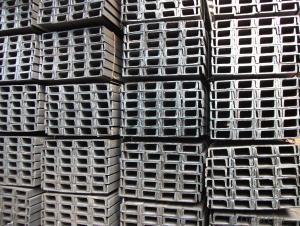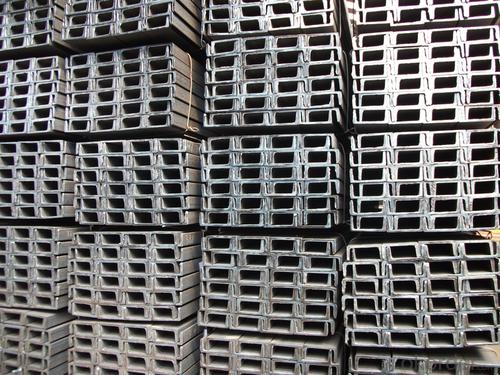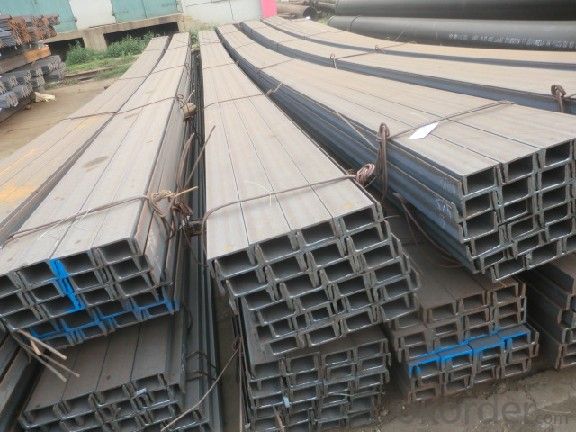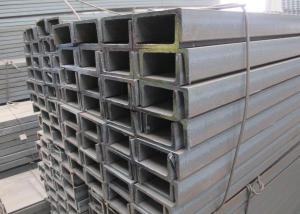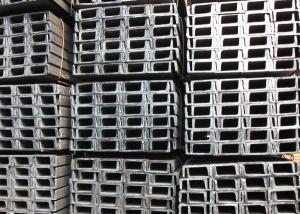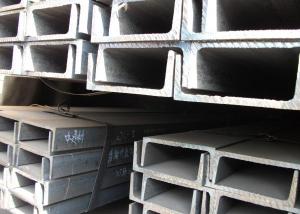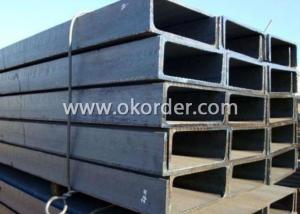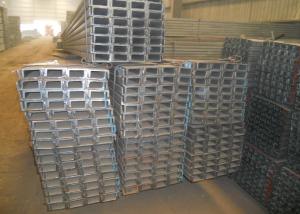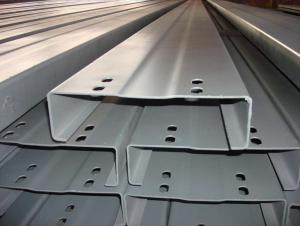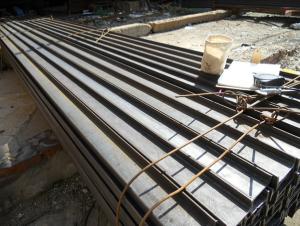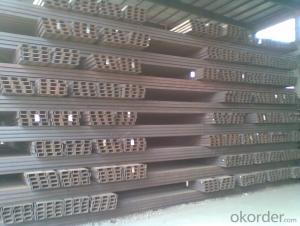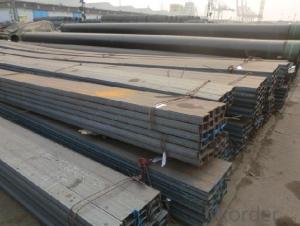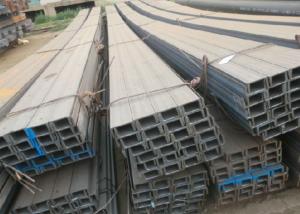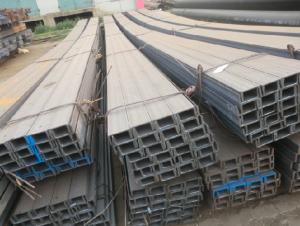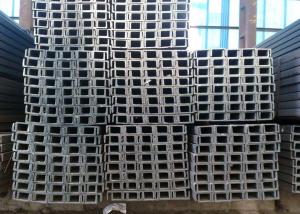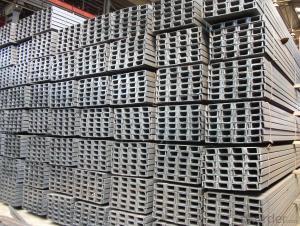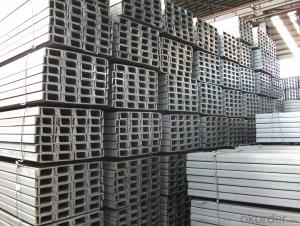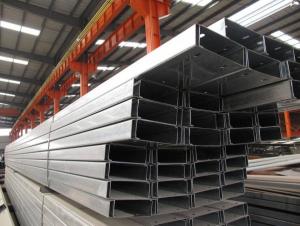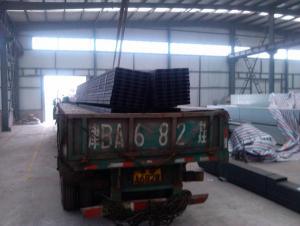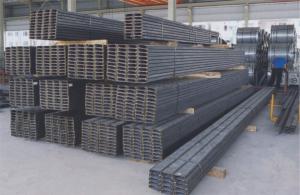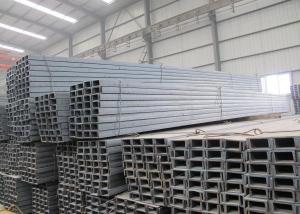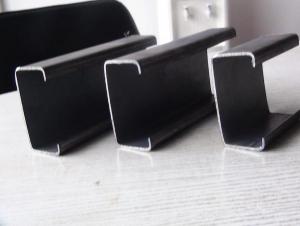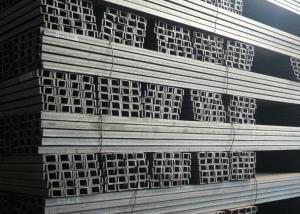channel
- Loading Port:
- China Main Port
- Payment Terms:
- TT OR LC
- Min Order Qty:
- -
- Supply Capability:
- -
OKorder Service Pledge
OKorder Financial Service
You Might Also Like
Product Description:
Specifications of MS Channel:
1.We supply high quality MS Channel at reasonable price, including Chinese standard, Japanese standard and so on.
Standard | GB/JIS |
Material Grade | Q235,SS400 |
Technique: | Hot Rolled |
Sizes as per chinese standard: | 50*37*4.5mm - 300*89*11.5mm |
Sizes as per japanese standard: | 50*25*3mm – 200*80*7.5mm |
Length: | 6meter, 9meter, 12meter |
Note: 1.we are also competent to provide our customers other MS Channel based on other sizes according to customer’s requirements.
2. The length of our ms channel could be cut into other meters as per customer’s requirements. For example, the channel in 6meters could be cut into 5.8meters in order to be fit in the 20ft container.
2. The detailed sections of MS Channel as per GB standard.are shown in the table-1:
GB U CHANNEL | Standard | Sectional | Dimension |
| Mass: |
| (mm) | (mm) | (mm) | (mm) |
|
50X37 | 50 | 37 | 4.50 | 7.0 | 5.438 |
63X40 | 63 | 40 | 4.80 | 7.5 | 6.634 |
80x43 | 80 | 43 | 5.00 | 8.0 | 8.045 |
|
|
|
|
|
|
100x48 | 100 | 48 | 5.30 | 8.5 | 10.007 |
120x53 | 120 | 53 | 5.50 | 9.0 | 12.059 |
140x58 | 140 | 58 | 6.00 | 9.5 | 14.535 |
140x60 | 140 | 60 | 8.00 | 9.5 | 16.733 |
|
|
|
|
|
|
160x63 | 160 | 63 | 6.50 | 10.0 | 17.240 |
160x65 | 160 | 65 | 8.50 | 10.0 | 19.752 |
|
|
|
|
|
|
180x68 | 180 | 68 | 7.00 | 10.5 | 20.174 |
180x70 | 180 | 70 | 9.00 | 10.5 | 23.000 |
|
|
|
|
|
|
200x73 | 200 | 73 | 7.00 | 11.0 | 22.637 |
200x75 | 200 | 75 | 9.00 | 11.0 | 25.777 |
|
|
|
|
|
|
220x77 | 220 | 77 | 7.00 | 11.5 | 24.999 |
220x79 | 220 | 79 | 9.00 | 11.5 | 28.453 |
|
|
|
|
|
|
250x78 | 250 | 78 | 7.00 | 12.0 | 27.410 |
250x80 | 250 | 80 | 9.00 | 12.0 | 31.335 |
250x82 | 250 | 82 | 11.00 | 12.0 | 35.260 |
|
|
|
|
| |
280x82 | 280 | 82 | 7.50 | 12.5 | 31.427 |
280x84 | 280 | 84 | 9.50 | 12.5 | 35.823 |
280x86 | 280 | 86 | 11.50 | 12.5 | 40.219 |
|
|
|
|
|
|
300x85 | 300 | 85 | 7.50 | 13.5 | 34.463 |
300x87 | 300 | 87 | 9.50 | 13.5 | 39.173 |
300x89 | 300 | 89 | 11.50 | 13.5 | 43.883 |
Table-1
3. The chemical composition of HR Channel Steel according to Q235B is shown in Table-2.
Alloy No | Grade | Element(%) | ||||
C | Mn | S | P | Si | ||
Q235 | B | 0.12-0.20 | 0.3-0.7 | ≦0.045 | ≦0.045 | ≦0.3 |
Table-2
Note: we are able to present our customers relevant SGS test report for chemical composition of HR Channel Steel.
4. The mechanical property of HR Channel Steel according to Q235B is shown in Table-3-1 and Table-3-2
Alloy No | Grade | Yielding Strength Point(Mpa) | |||
Thickness(mm) | |||||
≦16 | >16-40 | >40-60 | >60-100 | ||
≧ | |||||
Q235 | B | 235 | 225 | 215 | 205 |
Table-3-1
Alloy No | Grade | Tensile Strength(Mpa) | Elongation After Fracture(%) | |||
Thickness(mm) | ||||||
≦16 | >16-40 | >40-60 | >60-100 | |||
≧ | ||||||
G235 | B | 375-500 | 26 | 25 | 24 | 23 |
Table-3-2
Note: we are able to present our customers relevant SGS test report for mechanical property of MS Channel as customer’s request.
Applications of MS Channel:
The MS Channel can be applied to construction of warehouses, workshops, sport stadiums and car parks etc.The hot rolled channel steel belongs to carbon structural steel which is applied to in the field of construction and machinery.In details, the hot rolled channel steel is usually used for arch-itechtural structure, and they could be welded in order to support or hang a vari-ety of facilities. They are also usually used in combination with I beam. Generally,the hot rolled channel steel we supply must possess perfect welding property, riveting property and mechanical property and so on.
Package & Delivery of MS Channel:
1.The hot rolled channel steel will be packed in bundle with steel wire at each end of every bundle and color marking in order to help the customer to recognize his goods more easily at sight.
2. And the hot rolled channel steel could be loaded into 20ft or 40ft container, or by bulk cargo.If the weight of each bundle reaches more than 3.5 mt, the loading by break bulk cargo should be choosed.When the weight of each bundle reaches less than 3mt, the loading by container should be choosed.
3.As for the transportaion from mill to loading port, the truck will be usually used. And the maximum quantity for each truck is 40mt.
4.All in all, we could do in accordance with customer's request
- Q: What are the guidelines for steel channel spacing in structural applications?
- The guidelines for steel channel spacing in structural applications vary depending on the specific requirements and codes set forth by local building authorities and engineering standards. However, there are some general guidelines that can be followed. 1. Code Compliance: The first and foremost guideline is to ensure compliance with the applicable building codes and regulations in your area. These codes often specify the minimum requirements for steel channel spacing based on the intended use and structural design. 2. Manufacturer's Recommendations: It is important to refer to the manufacturer's guidelines and recommendations for the specific steel channel being used. Manufacturers often provide detailed information on the maximum spacing allowed between channels to maintain structural integrity and load-bearing capacity. 3. Structural Analysis: A thorough structural analysis must be conducted by a qualified engineer to determine the appropriate spacing between steel channels. This analysis takes into account the loads and forces acting on the structure, as well as the specific design and configuration of the channels. 4. Span-to-Depth Ratio: The span-to-depth ratio is an important consideration when determining the spacing between steel channels. This ratio is typically calculated by dividing the distance between supports (span) by the depth of the channel. Higher span-to-depth ratios may require closer spacing to prevent excessive deflection and ensure structural stability. 5. Load Distribution: The spacing of steel channels should also be determined based on the intended load distribution. Channels spaced too far apart may result in uneven load distribution, leading to localized stress concentrations and potential failure. Proper spacing ensures a more uniform load distribution and enhances the overall strength and stability of the structure. 6. Deflection Limits: Deflection refers to the bending or deformation of steel channels under load. Deflection limits are often set by building codes or engineering standards and should be considered when determining channel spacing. Closer spacing can help reduce deflection and ensure that the structure performs as intended. It is crucial to consult with a professional structural engineer or follow the guidance of a licensed design professional to determine the appropriate spacing for steel channels in any structural application.
- Q: What are the different methods for reinforcing steel channels against bending?
- There are several methods for reinforcing steel channels against bending. 1. Adding additional steel plates: One method is to add steel plates to the top and bottom flanges of the channel. These plates are welded or bolted to the existing flanges, increasing their strength and stiffness. This method is commonly used when the channel is subjected to high bending forces or when it needs to carry heavier loads. 2. Using channel stiffeners: Channel stiffeners are additional steel members that are attached to the inside or outside of the channel to increase its strength and prevent bending. These stiffeners are typically welded or bolted to the flanges and web of the channel. They distribute the bending forces more evenly across the channel, reducing the likelihood of failure. 3. Reinforcing with concrete: Another method is to reinforce the steel channel with concrete. This is often done by encasing the channel in a concrete layer, which provides additional strength and stiffness. The concrete can be poured around the channel or precast and then attached to it. This method is commonly used in construction applications, such as bridges and buildings, where the channel needs to resist high bending forces. 4. Using composite materials: Composite materials, such as carbon fiber reinforced polymer (CFRP), can also be used to reinforce steel channels against bending. CFRP strips or sheets can be bonded to the channel's flanges or web, providing additional strength and stiffness. This method is lightweight and can be easily applied to existing structures or during fabrication. It is important to note that the choice of reinforcement method depends on various factors, including the magnitude of the bending forces, the type of application, and the available resources. Consulting with a structural engineer or a professional in the field is recommended to determine the most suitable method for a specific project.
- Q: Can steel channels be used for supporting exterior cladding systems?
- Steel channels have the capability to support exterior cladding systems effectively. Their strength and durability make them well-suited for providing structural support to the cladding. By using steel channels, it is possible to establish a framework that securely holds the cladding in place, ensuring its attachment to the building's exterior is stable. Moreover, steel channels offer design flexibility and can be tailored to meet specific project requirements. Furthermore, steel exhibits resistance to weathering and corrosion, making it a dependable selection for exterior applications where the cladding must endure diverse environmental conditions. Overall, steel channels are highly favored for supporting exterior cladding systems due to their strength, durability, and adaptability.
- Q: I encountered in the construction of 2 short 28# channel welding, processed into beams, how to weld? Do I have to have stiffened panels? How many pieces? What's the thickness of the stiffener? I heard that there is a book called "metal processing manual", which has instructions, but I do not have the book. Please give settlement.
- If the gap between the two weldment is not conducive to welding, it can be welded with a piece of steel plate. If the assembly gap is reasonable, direct rust removal and welding can be done.
- Q: Can steel channels be used for creating partitions or dividers?
- Yes, steel channels can be used for creating partitions or dividers. Steel channels are versatile structural components that are commonly used in construction and fabrication projects. They are known for their strength, durability, and ability to withstand heavy loads. When used for creating partitions or dividers, steel channels can provide excellent support and stability. They can be easily installed and offer a strong framework for dividing spaces or creating separate areas within a building. Steel channels can be used in various applications, such as offices, warehouses, industrial facilities, and residential spaces. Steel channels can be customized to meet specific design requirements and can be combined with other materials, such as glass or wood, to create visually appealing partitions. Additionally, steel channels offer fire resistance, making them suitable for creating fire-rated partitions in commercial buildings. In summary, steel channels are a reliable and practical choice for creating partitions or dividers. Their strength, durability, versatility, and fire resistance make them an ideal option for various construction projects.
- Q: Do steel channels require any special maintenance?
- No special maintenance is required for steel channels, but their longevity and performance can be ensured through regular maintenance. This typically involves cleaning and inspecting the channels for any indications of damage or corrosion. If any problems are discovered, they should be addressed promptly to prevent further deterioration. Furthermore, regular lubrication of the channels can help minimize friction and wear, thus guaranteeing smooth operation. By adhering to these maintenance practices, steel channels can maintain their optimal condition and deliver consistent support and structural integrity.
- Q: Can the bypass of the overhanging layer on the site be made of channel steel? How can I put the channel steel, if possible?
- Reinforcement measures shall be taken if the floor thickness is less than 120mm. 6.10.9 the cantilever beam spacing shall be set by the vertical distance of the vertical pole of the cantilever frame, and each vertical distance shall be provided with one root. 6.10.10 the outer bracing of the cantilever shall be set up from bottom to top. The scissors support shall comply with the provisions of articles 6.6.2 and 6.6.5 of this code.
- Q: Can steel channels be used in sports facilities?
- Yes, steel channels can be used in sports facilities. Steel channels are commonly used in the construction of sports facilities such as stadiums, arenas, and gymnasiums. They provide structural support for various components such as overhead lighting, scoreboards, and seating systems. Steel channels offer strength, durability, and flexibility, making them an ideal choice for sports facility construction.
- Q: How do steel channels perform under earthquake loads?
- Steel channels are known for their excellent strength and ductility, which allows them to perform well under earthquake loads. The structural integrity and stiffness of steel channels help to effectively resist seismic forces and minimize damage. They can absorb and distribute the energy generated during an earthquake, reducing the chances of collapse or failure. Additionally, steel channels can be designed and reinforced to withstand specific seismic conditions, making them a reliable choice for earthquake-resistant structures.
- Q: What is the significance of the dimensions of steel channels?
- The dimensions of steel channels are significant as they determine the strength, load-bearing capacity, and overall structural integrity of the channel. The size and shape of the channel affect its ability to distribute weight and resist bending or buckling under various loads. Additionally, the dimensions of steel channels are crucial in determining their compatibility with other structural elements, allowing for efficient and effective construction and design.
Send your message to us
channel
- Loading Port:
- China Main Port
- Payment Terms:
- TT OR LC
- Min Order Qty:
- -
- Supply Capability:
- -
OKorder Service Pledge
OKorder Financial Service
Similar products
Hot products
Hot Searches
Related keywords
